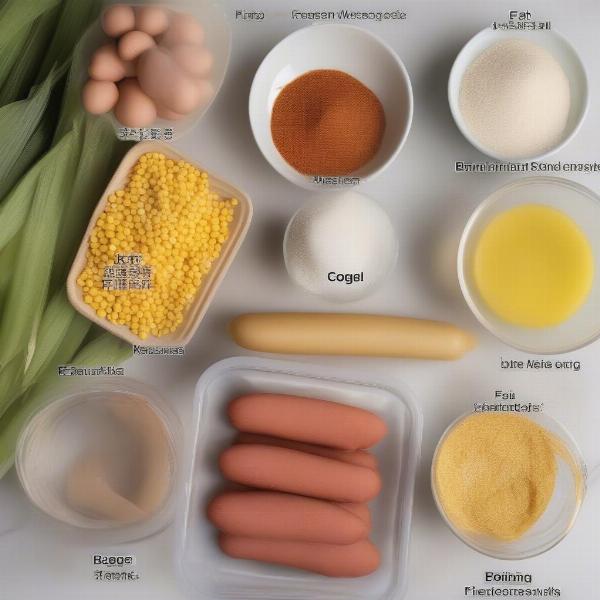Korean corn dogs are a delicious treat for humans, but what about our furry friends? While the savory snack might tempt your pup, it’s important to remember that human food isn’t always suitable for dogs. This article explores the potential dangers of Korean corn dogs for dogs and offers healthy alternatives to satisfy your dog’s cravings. We’ll also explore some delicious and healthy Korean-inspired treats you can share with your canine companion.
While the aroma of a freshly fried Korean corn dog might be irresistible, sharing this treat with your dog can lead to several health issues. The high fat content can cause pancreatitis, a serious and potentially life-threatening inflammation of the pancreas. Additionally, the processed meats often used in Korean corn dogs are typically high in sodium, which can lead to dehydration and other health problems in dogs. The skewers themselves present a choking hazard, and the sugary coatings can contribute to dental issues and weight gain.
Why Korean Corn Dogs Aren’t for Dogs
Let’s break down why these tasty treats are a no-go for your four-legged friend. Firstly, the batter often contains ingredients like wheat flour, which can be difficult for some dogs to digest, leading to gastrointestinal upset.
 Korean Corn Dog Ingredients
Korean Corn Dog Ingredients
Secondly, many Korean corn dogs are deep-fried, adding a significant amount of unhealthy fat to your dog’s diet. This can contribute to obesity and other health problems in the long run.
Finally, the various toppings and sauces often served with Korean corn dogs, such as ketchup, mustard, and sugary glazes, can further exacerbate digestive issues and add unnecessary calories to your dog’s diet.
Healthy Korean-Inspired Treats for Your Dog
Instead of sharing your Korean corn dog, opt for healthy, dog-friendly alternatives inspired by Korean cuisine. For instance, consider small pieces of lean, cooked chicken or beef marinated in a dog-safe version of a Korean BBQ sauce (made without onions, garlic, or excessive sugar).
You can also offer your dog small portions of cooked sweet potato, a staple in Korean cuisine, as a healthy and delicious treat. Remember to always introduce new foods gradually to monitor for any allergic reactions or digestive upset.
Delicious and Nutritious Korean-Style Dog Food
Looking for commercially available options? dog food korea offers a guide to high-quality Korean dog food brands that prioritize natural ingredients and balanced nutrition. These brands often incorporate ingredients like seaweed, ginseng, and other beneficial ingredients commonly found in Korean cuisine.
Homemade Dog Treats with a Korean Twist
Why not try making your own Korean-inspired dog treats at home? You can find numerous recipes online that incorporate ingredients like lean meats, rice, and dog-safe vegetables.
For instance, you could create small, bite-sized patties made with ground chicken or beef, rice flour, and finely chopped carrots and sweet potato. Remember to avoid any ingredients toxic to dogs, such as onions, garlic, and xylitol.
Vegetarian Alternatives for Your Pup
Even if your dog prefers a plant-based diet, you can still find delicious Korean-inspired options. vegetarian korean corn dog explores vegetarian Korean corn dog adaptations and other meat-free Korean-inspired snacks suitable for dogs.
Can Dogs Eat Mozzarella? A Cheesy Question
While some cheeses can be enjoyed by dogs in moderation, mozzarella, a popular addition to some Korean corn dogs, should be given sparingly. It’s relatively high in fat and lactose, which can cause digestive upset in some dogs. If you want to give your dog a cheesy treat, opt for low-fat cottage cheese or plain yogurt instead. You might also enjoy our article about potato mozzarella corn dog for yourself!
Conclusion
While Korean corn dogs are a tempting treat for humans, they are not suitable for dogs due to their high fat content, processed ingredients, and potential choking hazards. Instead, focus on providing your dog with healthy, dog-friendly alternatives inspired by Korean cuisine. By prioritizing your dog’s nutritional needs, you can ensure they enjoy a long, healthy, and happy life.
FAQ
- What should I do if my dog accidentally eats a Korean corn dog? Monitor your dog for any signs of digestive upset, such as vomiting or diarrhea. If your dog exhibits any concerning symptoms, contact your veterinarian immediately.
- Are there any Korean-inspired dog treats available commercially? Yes, several Korean dog food brands prioritize natural ingredients and balanced nutrition, often incorporating ingredients like seaweed and ginseng.
- Can I make homemade Korean-inspired dog treats? Absolutely! Numerous recipes online use dog-safe ingredients like lean meats, rice, and vegetables.
- What are some healthy alternatives to Korean corn dogs for my dog? Consider small pieces of cooked chicken or beef marinated in a dog-safe Korean BBQ sauce, cooked sweet potato, or homemade treats with lean meats, rice flour, and dog-safe vegetables.
- Can dogs eat any type of cheese? Some cheeses can be enjoyed by dogs in moderation, but avoid high-fat varieties and those containing ingredients toxic to dogs.
- What are the potential dangers of feeding dogs human food? Many human foods contain ingredients toxic to dogs, can contribute to obesity and other health problems, and may cause digestive upset.
- What should I do if my dog has a food allergy? Consult your veterinarian for testing and guidance on creating a safe and nutritious diet for your dog.
About ILM Dog: ILM Dog is your trusted source for expert advice on all aspects of dog care, from breed selection and puppy care to senior dog health and training. We offer a wealth of resources, including articles on dog nutrition, behavior, grooming, and product reviews. Our mission is to empower dog owners worldwide with the knowledge and resources they need to provide the best possible care for their beloved companions. For expert advice tailored to your dog’s specific needs, contact us at [email protected] or call us at +44 20-3965-8624.